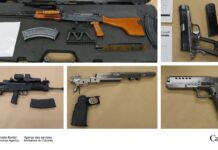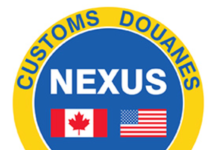THE Canada Border Services Agency (CBSA) Pacific Region (British Columbia and Yukon Territory) on Thursday released operational and enforcement highlights that it said demonstrate how CBSA employees throughout the region have worked to safeguard communities while supporting the economy during these unprecedented times. The 2020 operational and enforcement highlights cover January 1 to October 31, 2020.
Nina Patel, Regional Director General, Pacific Region, CBSA, said: “Throughout the pandemic, the Canada Border Services Agency continued to work around the clock to screen goods and people, making sure that goods entered our supply chain to support our economy and that inadmissible goods and people remained out of our country. Despite the travel restrictions in place, we still had a busy year with various enforcement actions and I am extremely proud of our officers and employees in the Pacific Region who dedicate each day to protecting the safety and security of Canadians.”
Keeping drugs out
- In February, border services officers at the Tsawwassen Container Examination Facility examined a container and discovered bags of white crystal. The CBSA laboratory confirmed the results were positive for methamphetamine. The drugs weighed 106 kilograms and the CBSA estimates its value to be approximately $13.5 million CAD.
- In May, border services officers at the Pacific Highway port of entry Commercial Operations conducted an examination on a commercial tractor-trailer and noticed anomalies. Twenty bricks of suspected cocaine were discovered, weighing approximately 20 kilograms in total, and estimated to be worth over $2.5 million CAD.
- In May, border services officers at the Vancouver International Mail Centre seized 1.4 kilograms of suspected methamphetamine hidden within a shipment of toys and electronics during an export exam.
- In June, officers from the Vancouver Island Mobile Enforcement Team, Victoria Marine Operations and the Pacific Region Intelligence Section boarded a commercial vessel at Constance Bank Anchorage to perform an examination. Eleven individually wrapped packages of suspected cocaine were located and seized.
- In August, Vancouver International Airport Air Cargo officers examined a shipment declared as corn powder, grinded egusi and fish oil. A closer examination revealed 463.75 kilograms of Catha Edulis, also known as “khat.” An additional 536 kilograms of khat was seized the next day from the same importer.

- In October, Vancouver International Airport Air Cargo officers intercepted two shipments of heavy pieces of machinery (see above photo). Officers noticed anomalies and upon closer examination, discovered 18 bricks of suspected cocaine inside the machine parts. The drugs weighed 6.5 kilograms and are estimated to be valued at $786,000 CAD.
Intercepting guns and weapons
- In February, border services officers at the Paterson port of entry discovered a camouflaged pouch which contained a loaded prohibited .38 calibre pistol. The subject was arrested for smuggling a prohibited firearm into Canada and the firearm was seized.
- In April, four travellers transiting to Alaska declared three rifles and a pistol upon their arrival at the Pacific Highway port of entry. A secondary examination of their vehicle revealed additional undeclared firearms including handguns, long guns and military grade assault rifles, and 13 over-capacity magazines. Several of these handguns, as well as undeclared cash, were located within a hidden compartment in the vehicle.

- In June, the Vancouver Island Mobile Enforcement Team seized an undeclared semi auto pistol, a prohibited rifle, two overcapacity magazines and 230 grams of cannabis products from a fishing vessel in the Southern Gulf Islands (see above photo).
- In June, border services officers performed a secondary examination on a motorhome entering Canada at the Kingsgate port of entry. Inside the motorhome were two prohibited handguns, personal amounts of various drugs and non-reported currency valued at $26,000 USD and 1 million Iraqi Dinar, all of which were seized. Border services officers also discovered non-reported hippo tusks and bear skulls, which were detained and referred to Environment and Climate Change Canada. The traveller has been charged under the Customs Act for smuggling, and under the Criminal Code of Canada for illegal possession of firearms.
- In July, Metro Vancouver Traveller Operations and the Metro Vancouver Marine Boat Team attended Steveston docks in Richmond, BC, and seized undeclared firearms including three long guns and two hand guns from two travellers that entered Canada by boat.
- In July, officers at the Abbotsford-Huntingdon port of entry seized 14 firearms including four prohibited semi-automatic rifles (assault-style); three prohibited handguns; one restricted handgun; and six non-restricted long guns. The traveller had not declared the firearms and faced charges.
Supporting a strong economy
- The CBSA uses the Administrative Monetary Penalty System (AMPS) and may impose monetary penalties to commercial clients for violating CBSA’s trade and border legislation. As a result of Project Purify, seven commercial importers were fined over $36,000 CAD under the AMPS for various infractions including failing to provide a required certificate, licence, permit or information for the goods.
- In January, Trade Compliance Officers determined that a foreign importer of personalized stationaries contravened the Customs Act and directed the importer to correct the value of their previous four years of imports, over $14 million CAD in value for duty. As a result, the Pacific Region Trade Operations Division recovered $1.9 million CAD in customs duties, GST and interest, and an additional $500 under the AMPS, from the importer.
- In July, Trade Compliance Officers determined that a foreign apparel importer contravened the Customs Act and directed the importer to correct the value of their previous four years of imports, close to $4 million CAD in value for duty. As a result, the Pacific Region Trade Operations Division recovered over $806,000 CAD in customs duties, GST and interest, and an additional $500 under the AMPS, from the importer.
Additional highlights
- The Pacific Region Criminal Investigations Section successfully disrupted Project Interpretation, a human smuggling ring. In January, Michael Shun Lok Kong was sentenced in Richmond Provincial Court to five counts pursuant to section 117 of the Immigration and Refugee Protection Act (IRPA) for the smuggling of 27 foreign nationals, including two unaccompanied minors, into Canada.
- In August, the Pacific Region Inland Enforcement Section launched an investigation into two foreign nationals for engaging in transnational organized crime. The two individuals were seen in between ports of entry and had dropped two large backpacks, which contained methamphetamine. Upon fleeing to Canada, they were intercepted by the RCMP and charged. The individuals were also referred to the Pacific Region National Security Unit for further investigation regarding contraventions against the Customs Act and the IRPA.
- In August, border services officers from the Vancouver International Airport Traveller Operations performed a currency verification check on an individual that was about to board his flight for Europe. The individual stated that he was below the currency threshold but upon verification, bank notes totalling over $16,000 CAD were discovered in his belongings. After further examination, the money was seized as suspected proceeds of crime with no terms of release.
- In September, following an extensive investigation into a consulting business in Surrey, BC, the Pacific Region Criminal Investigations Section laid 113 charges against six individuals for misrepresentation offences under the IRPA and an additional 11 counts pursuant to the Criminal Code against one of those individuals for firearm offences.
- From July 31 to October 2, the Pacific Region Intelligence Section implemented Project Panhandler in collaboration with partners to intercept non-compliant boaters during the pandemic. While the majority of the 351 small vessels entering the Pacific Region complied with border legislation, there were nine CBSA enforcement actions for contraventions of the IRPAand the Customs Act.
- Project Trajectory, a multi-year investigation by the Pacific Region Criminal Investigations Section, finally came to an end on October 28 after the remaining two individuals (of four) were sentenced for their roles in a steroid smuggling and distribution ring in British Columbia.
- The CBSA places highest priority on removal cases involving national security, organized crime, crimes against humanity, criminals and individuals with immigration violations.The Pacific Region Inland Enforcement Section removed 609 foreign nationals from Canada, including three convicted murderers.
Quick Facts
- The Pacific Region is home to 43 land, air and marine ports of entry, including an international mail centre, Canada’s second busiest airport and largest marine port.
- The Pacific Region has five districts (West Coast and Yukon, Okanagan and Kootenay, Metro Vancouver, Pacific Highway, and Vancouver International Airport) and three divisions (Enforcement and Intelligence, Trade Operations, and Corporate and Program Services).
- From January to October 2020, CBSA officers in the Pacific Region processed 4,688,599 people entering Canada, while not allowing entry to 8,905 travellers for various reasons including international travel restrictions and immigration concerns.
- Over the same time period, CBSA officers in the Pacific Region processed over 570,000 commercial trucks; over 1 million marine containers; and 18 million courier shipments.
- Over the same time period, the Pacific Region had 10,686 drug seizures, 21,981 weapon seizures, 116 currency seizures, and issued AMPS in the amount of $998,950 CAD.
- The CBSA is working closely with the Public Health Agency of Canada (PHAC) to help prevent the spread of COVID-19 into Canada at all international ports of entry. PHAC is responsible for advising the CBSA of any required enhanced measures to be implemented at the Canadian border to help prevent the spread of serious infectious diseases into Canada.
- For information on current border measures and requirements during COVID-19, visit the CBSA website or call the CBSA’s information line (1-800-461-9999) or visit canada.ca/coronavirus.
- Travellers are encouraged to keep up-to-date on matters related to COVID-19 by checking with the Government of Canada’s COVID-19 Web page.
- All travellers (asymptomatic and symptomatic) are required to provide their contact information using the Traveller Contact Information Form (paper or online), the ArriveCAN mobile application, or to a border services officer verbally (land mode only) and follow the 14-day quarantine or isolation requirement. All information collected in the Traveller Contact Information Form is provided to PHAC. The App is available on the Apple App and Google Play stores.














